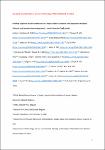Profiling cognitive–motor interference in a large sample of persons with progressive multiple sclerosis and impaired processing speed: results from the CogEx study
| dc.contributor.author | Veldkamp, R | |
| dc.contributor.author | D’hooge, M | |
| dc.contributor.author | Sandroff, BM | |
| dc.contributor.author | DeLuca, J | |
| dc.contributor.author | Kos, D | |
| dc.contributor.author | Salter, A | |
| dc.contributor.author | Feinstein, A | |
| dc.contributor.author | Amato, MP | |
| dc.contributor.author | Brichetto, G | |
| dc.contributor.author | Chataway, J | |
| dc.contributor.author | Farrell, R | |
| dc.contributor.author | Chiaravalloti, ND | |
| dc.contributor.author | Dalgas, U | |
| dc.contributor.author | Filippi, M | |
| dc.contributor.author | Freeman, Jennifer | |
| dc.contributor.author | Motl, RW | |
| dc.contributor.author | Meza, C | |
| dc.contributor.author | Inglese, M | |
| dc.contributor.author | Rocca, MA | |
| dc.contributor.author | Cutter, G | |
| dc.contributor.author | Feys, P | |
| dc.date.accessioned | 2023-07-19T10:47:30Z | |
| dc.date.available | 2023-07-19T10:47:30Z | |
| dc.date.issued | 2023-03-07 | |
| dc.identifier.issn | 0340-5354 | |
| dc.identifier.issn | 1432-1459 | |
| dc.identifier.uri | https://pearl.plymouth.ac.uk/handle/10026.1/21054 | |
| dc.description.abstract |
BACKGROUND: Performing cognitive-motor dual tasks (DTs) may result in reduced walking speed and cognitive performance. The effect in persons with progressive multiple sclerosis (pwPMS) having cognitive dysfunction is unknown. OBJECTIVE: To profile DT-performance during walking in cognitively impaired pwPMS and examine DT-performance by disability level. METHODS: Secondary analyses were conducted on baseline data from the CogEx-study. Participants, enrolled with Symbol Digit Modalities Test 1.282 standard deviations below normative value, performed a cognitive single task ([ST], alternating alphabet), motor ST (walking) and DT (both). Outcomes were number of correct answers on the alternating alphabet task, walking speed, and DT-cost (DTC: decline in performance relative to the ST). Outcomes were compared between EDSS subgroups (≤ 4, 4.5-5.5, ≥ 6). Spearman correlations were conducted between the DTCmotor with clinical measures. Adjusted significance level was 0.01. RESULTS: Overall, participants (n = 307) walked slower and had fewer correct answers on the DT versus ST (both p < 0.001), with a DTCmotor of 15.8% and DTCcognitive of 2.7%. All three subgroups walked slower during the DT versus ST, with DTCmotor different from zero (p's < 0.001). Only the EDSS ≥ 6 group had fewer correct answers on the DT versus ST (p < 0.001), but the DTCcognitive did not differ from zero for any of the groups (p ≥ 0.039). CONCLUSION: Dual tasking substantially affects walking performance in cognitively impaired pwPMS, to a similar degree for EDSS subgroups. | |
| dc.format.extent | 3120-3128 | |
| dc.format.medium | Print-Electronic | |
| dc.language | en | |
| dc.publisher | Springer Science and Business Media LLC | |
| dc.subject | Multiple sclerosis | |
| dc.subject | Progressive | |
| dc.subject | Cognitive-motor interference | |
| dc.subject | Dual task | |
| dc.subject | Gait | |
| dc.title | Profiling cognitive–motor interference in a large sample of persons with progressive multiple sclerosis and impaired processing speed: results from the CogEx study | |
| dc.type | journal-article | |
| dc.type | Journal Article | |
| plymouth.author-url | https://www.webofscience.com/api/gateway?GWVersion=2&SrcApp=PARTNER_APP&SrcAuth=LinksAMR&KeyUT=WOS:000945298000002&DestLinkType=FullRecord&DestApp=ALL_WOS&UsrCustomerID=11bb513d99f797142bcfeffcc58ea008 | |
| plymouth.issue | 6 | |
| plymouth.volume | 270 | |
| plymouth.publication-status | Published | |
| plymouth.journal | Journal of Neurology | |
| dc.identifier.doi | 10.1007/s00415-023-11636-y | |
| plymouth.organisational-group | |Plymouth | |
| plymouth.organisational-group | |Plymouth|Research Groups | |
| plymouth.organisational-group | |Plymouth|Faculty of Health | |
| plymouth.organisational-group | |Plymouth|Faculty of Health|School of Health Professions | |
| plymouth.organisational-group | |Plymouth|Research Groups|Institute of Health and Community | |
| plymouth.organisational-group | |Plymouth|REF 2021 Researchers by UoA | |
| plymouth.organisational-group | |Plymouth|Users by role | |
| plymouth.organisational-group | |Plymouth|Users by role|Academics | |
| plymouth.organisational-group | |Plymouth|REF 2021 Researchers by UoA|UoA03 Allied Health Professions, Dentistry, Nursing and Pharmacy | |
| plymouth.organisational-group | |Plymouth|Users by role|Researchers in ResearchFish submission | |
| plymouth.organisational-group | |Plymouth|Research Groups|Plymouth Institute of Health and Care Research (PIHR) | |
| dc.publisher.place | Germany | |
| dcterms.dateAccepted | 2023-02-19 | |
| dc.date.updated | 2023-07-19T10:47:25Z | |
| dc.rights.embargodate | 2024-3-6 | |
| dc.identifier.eissn | 1432-1459 | |
| rioxxterms.versionofrecord | 10.1007/s00415-023-11636-y |


